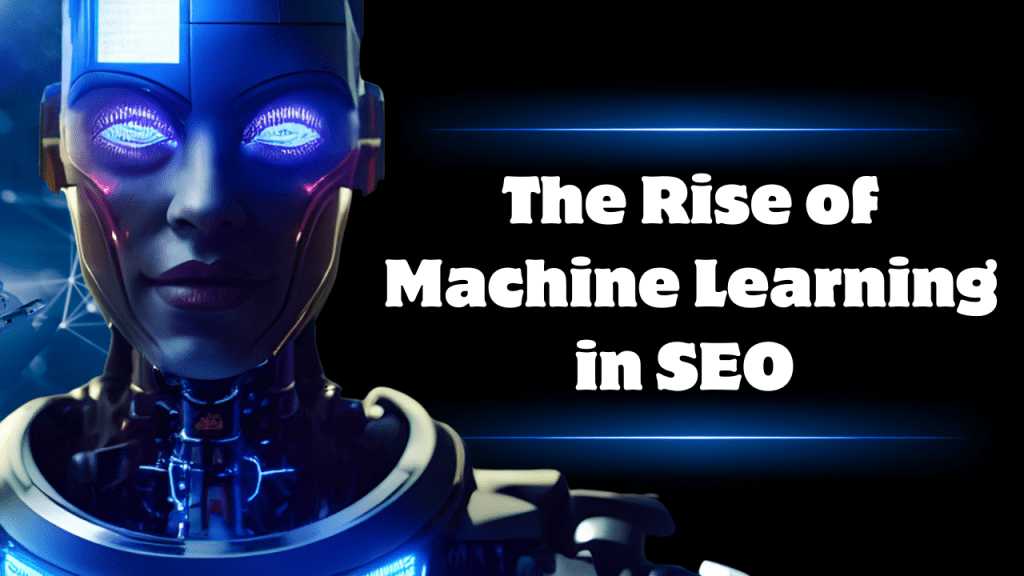Search engine optimization, or SEO, is now necessary for businesses to increase their online visibility and draw in organic visitors in the quickly changing digital landscape. With search algorithms becoming more complicated, machine learning (ML) has become a potent tool to improve SEO tactics. This blog examines how machine learning is used in SEO, how important it is to enhance search engine methods, and how it affects different SEO tactics.
Definition of Machine Learning (ML):
Machine Learning refers to the field of artificial intelligence (AI) that focuses on developing algorithms and models that enable computers to learn and make predictions or decisions without being explicitly programmed. ML algorithms learn from available data and iteratively improve their performance over time.
Integration of ML in SEO:
Machine Learning has found its way into the realm of SEO, transforming the way businesses optimize their websites for search engines. ML algorithms analyze vast amounts of data to identify patterns, trends, and user behaviour, enabling search engines to deliver more accurate and relevant search results.
Importance of ML in Search Engine Strategies:
ML plays a crucial role in enhancing search engine strategies by enabling search engines to understand user intent, deliver personalized search results, and adapt to changing user behaviour. It helps search engines provide better user experiences, improve organic rankings, and stay ahead of black-hat SEO techniques.
Related Topic : AI Search Engines: Key Features, Benefits and Challenges
Three Valuable Areas of Machine Learning in SEO:
1. Optimisation Techniques:
- Automated Content Generation: ML algorithms can generate high-quality, relevant content based on user intent, keyword analysis, and topic modelling. This streamlines content creation processes and helps businesses produce engaging content at scale.
- Dynamic Meta Tags and Descriptions: ML algorithms can dynamically generate meta tags and descriptions based on user queries, improving click-through rates and enhancing search result snippets.
- Personalization in SEO: ML algorithms can analyze user behaviour, preferences, and past interactions to personalize search results, delivering more relevant and tailored experiences.
2. User Experience Enhancement:
- AI-Enhanced User Experience: ML algorithms analyze user behaviour, engagement metrics, and feedback to improve the overall user experience on websites. This includes optimizing page load times, enhancing navigation, and providing personalized recommendations.
- Voice Search Optimization: ML algorithms process natural language and voice inputs, enabling businesses to optimize their websites for voice search queries, which are becoming increasingly popular.
- Natural Language Processing (NLP): ML algorithms leverage NLP techniques to understand the context, semantics, and intent behind user queries, helping search engines deliver more accurate and contextually relevant search results.
3. Search Engine Algorithm Adaptation:
- RankBrain and its Impact: RankBrain, an ML algorithm used by Google, helps interpret ambiguous queries and improve search results based on user satisfaction signals. It uses historical data and user behaviour patterns to refine search rankings.
- Semantic Search Integration: ML algorithms enable search engines to understand the meaning and context of words, making it easier to provide relevant search results even when the query doesn’t match the exact keywords.
- Machine Learning-driven Competitor Analysis: ML algorithms can analyze competitor data, backlink profiles, and content strategies to identify opportunities and gain a competitive advantage in SEO.
Machine Learning in Web Search:
Google Search Algorithms:
- ML in Google’s Web Search: Google uses ML extensively in its search algorithms to improve search quality, relevance, and user satisfaction. ML algorithms analyze ranking factors, user signals, and historical data to refine search results.
- Big 3 of Machine Learning in Google Search: Google employs three prominent ML algorithms: RankBrain, BERT (Bidirectional Encoder Representations from Transformers), and Neural Matching. These algorithms enhance understanding, language processing, and search relevance.
YouTube Algorithm:
- Role of ML in YouTube Search: YouTube’s recommendation algorithm heavily relies on ML techniques to suggest relevant videos to users. ML algorithms analyze user behaviour, video metadata, and engagement metrics to personalize recommendations.
- Examples of Machine Learning in YouTube: ML algorithms enable YouTube to understand video content, extract relevant information, provide automatic captions, and enhance video recommendations based on user preferences.
Impact on SEO Techniques:
- Automated Keyword Research: ML algorithms can analyze search trends, user behaviour, and competitor data to identify relevant keywords and optimize content strategies accordingly, streamlining the keyword research process.
- AI-Optimized Local SEO: ML algorithms help businesses optimize their local SEO efforts by analyzing location data, user intent, and search patterns to provide relevant local search results and improve visibility in specific geographic areas.
- Data-driven Link Building: ML algorithms can analyze backlink profiles, anchor text patterns, and historical data to identify high-quality link-building opportunities, improving the effectiveness and efficiency of link-building strategies.
- ML-driven SEO Audits: ML algorithms can automate the process of auditing websites for SEO issues, analyzing factors such as page structure, content quality, mobile-friendliness, and site speed, providing actionable insights for optimization.
Related Topic : AI Content and SEO: Benefits, Challenges, and Best Practices
The Role of Machine Learning Models:
- Algorithm Selection in ML for SEO: SEO professionals can leverage ML models to select the most appropriate algorithms for specific tasks, such as content generation, keyword analysis, or user behaviour analysis. ML models can analyze data and recommend the best algorithms based on performance metrics and objectives.
- Machine Learning Models Used in SEO: Various ML models are used in SEO, including decision trees, random forests, support vector machines (SVM), neural networks, and deep learning models. Each model has its strengths and weaknesses, and their selection depends on the specific SEO task at hand.
- ML and Traditional Optimization – Differences and Similarities: ML-based optimization differs from traditional optimization methods in that it involves training algorithms on data to learn patterns and make predictions automatically. Traditional optimization relies on human experts manually adjusting parameters. However, both approaches aim to improve search rankings, user experience, and overall website performance.
Google’s use of AI and ML in SEO:
- AI’s Impact on Google’s Search Strategies: Google has been incorporating AI and ML into its search strategies to provide more accurate and relevant search results. ML algorithms help Google understand user intent, interpret queries, and improve the overall search experience.
- ML in Google Cloud – Enhancing SEO Capabilities: Google Cloud offers various ML tools and services that businesses can leverage to enhance their SEO efforts. These tools provide capabilities such as natural language processing, image and video analysis, sentiment analysis, and predictive modelling, enabling businesses to gain insights and optimize their SEO strategies.
AI Tools for SEO:
Overview of AI Tools: There are numerous AI tools available that can assist SEO professionals in various tasks, such as keyword research, content optimization, link building, and performance tracking. These tools leverage ML algorithms to automate processes, analyze data, and provide actionable insights.
Best AI Tool for SEO: The choice of the best AI tool for SEO depends on specific requirements and objectives. Some popular AI tools for SEO include :
These tools offer a range of features to improve keyword analysis, competitor research, technical SEO, and performance monitoring.
Detection of AI by SEO Algorithms: SEO algorithms, including search engine algorithms, have become more sophisticated in detecting AI-generated content or manipulative AI techniques. It is crucial for businesses to ensure ethical and genuine use of AI tools to avoid penalties and maintain a positive online presence.
For further exploration of this exciting frontier, follow AI-powered SEO on LinkedIn.
Wrap up:
Recap of Machine Learning’s Significance in SEO: Machine Learning has significantly impacted SEO by enabling search engines to understand user intent, improve search relevance, and provide personalized experiences. ML has influenced various SEO techniques, including content generation, user experience enhancement, and algorithm adaptation.
Future Trends and Developments: The integration of ML in SEO will continue to evolve, with advancements in natural language processing, image and video analysis, and voice search optimization. The use of AI tools and ML models will become more sophisticated, enabling businesses to stay competitive in the evolving digital landscape.
Closing Thoughts on the Symbiotic Relationship between ML and SEO: The symbiotic relationship between ML and SEO is evident in the way ML algorithms enhance search engine strategies and optimize websites for better visibility and user experience. Embracing ML in SEO empowers businesses to adapt to changing search algorithms, deliver personalized experiences, and achieve sustainable organic growth.

